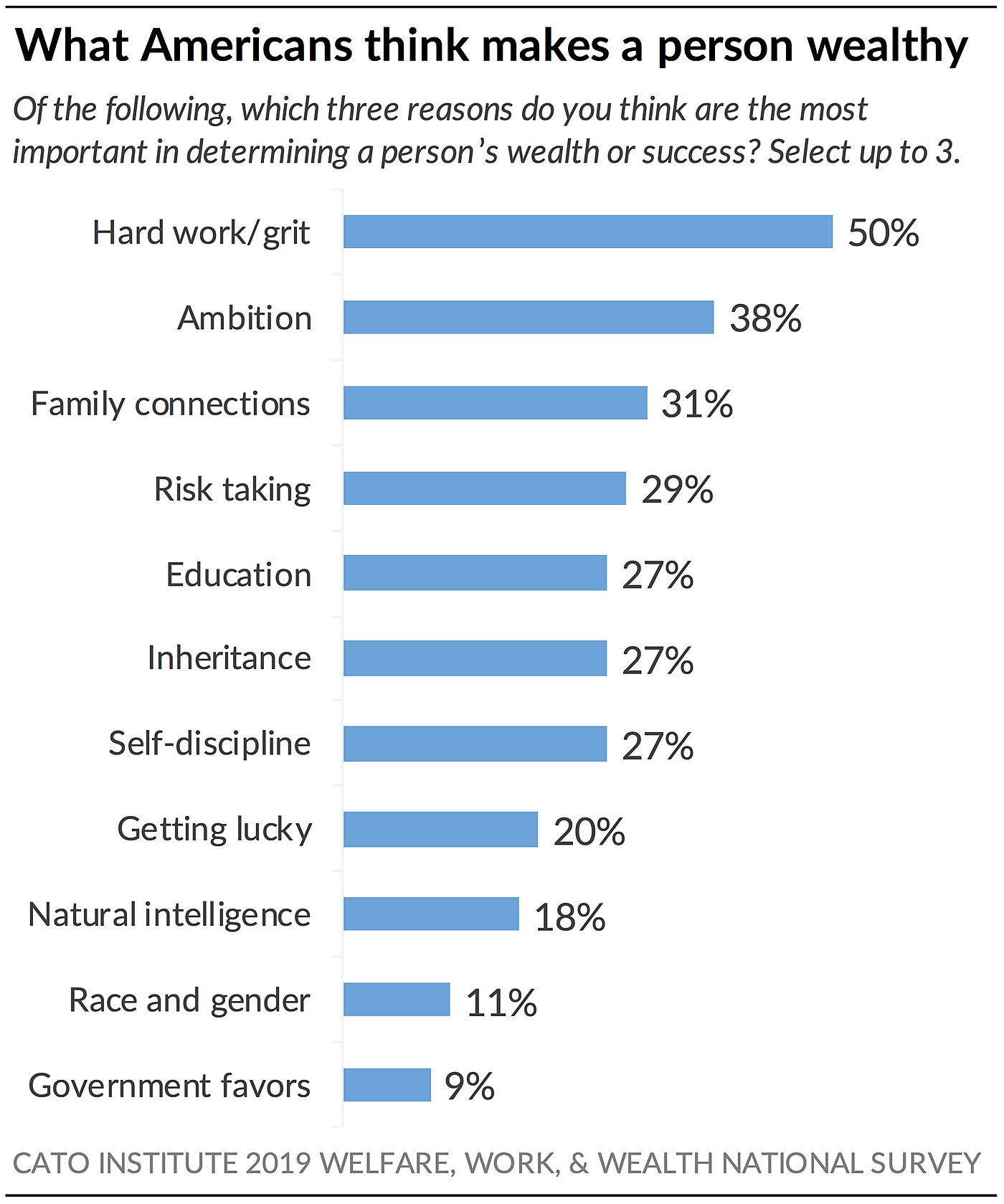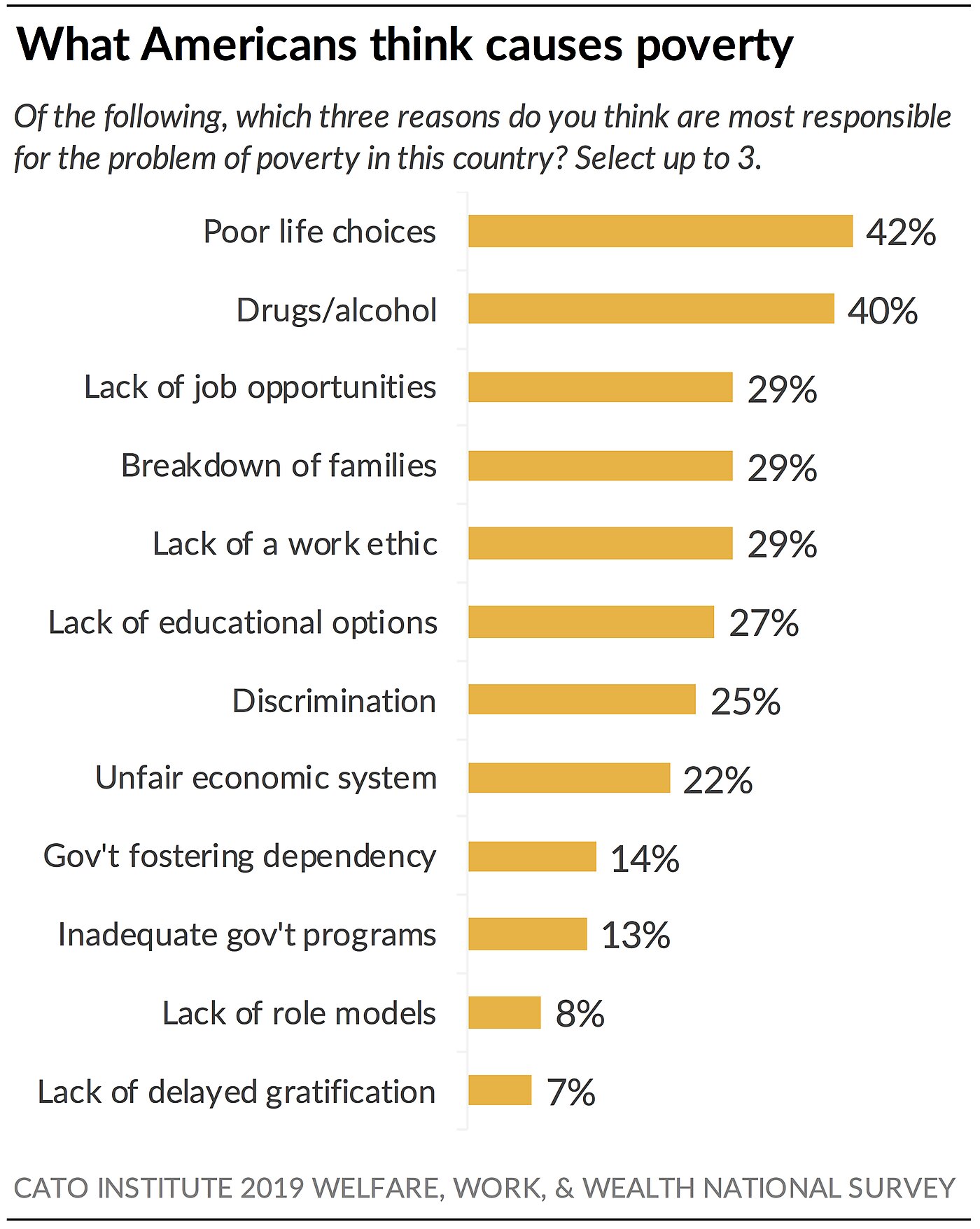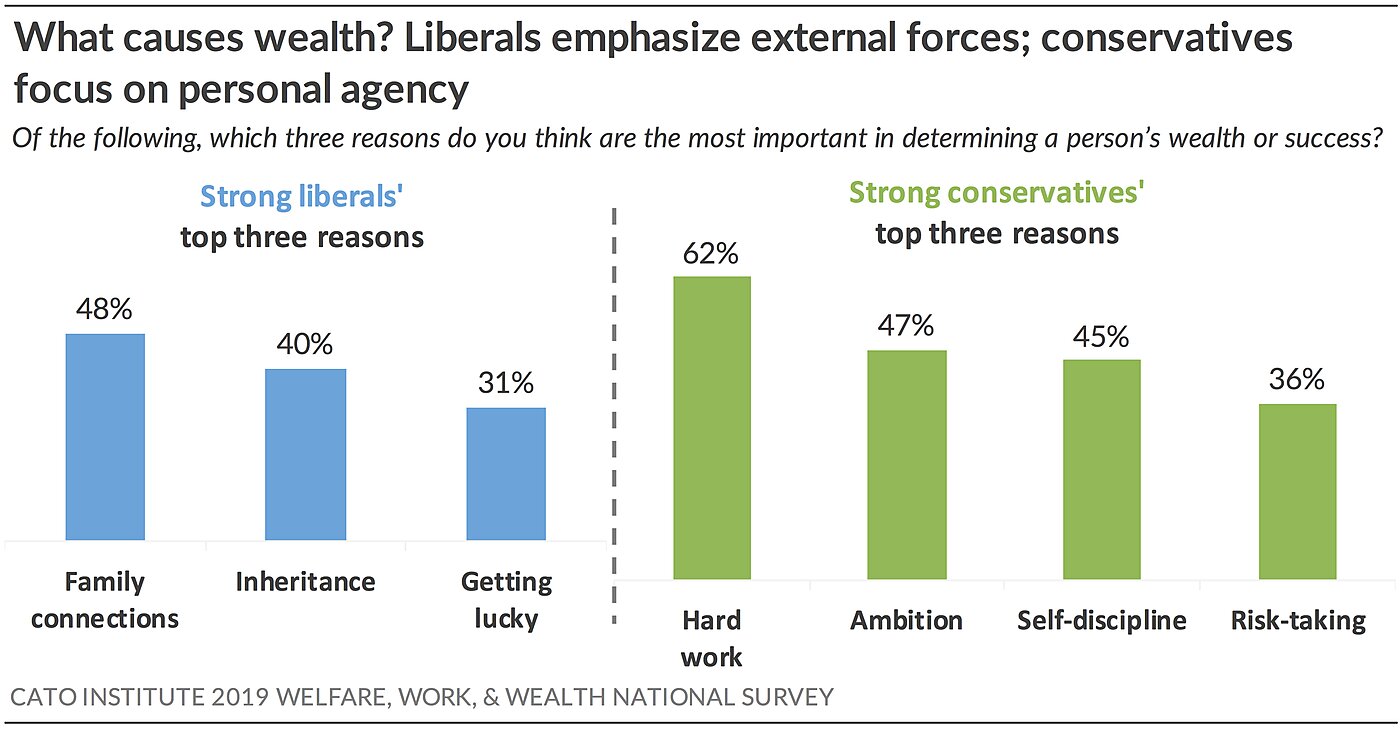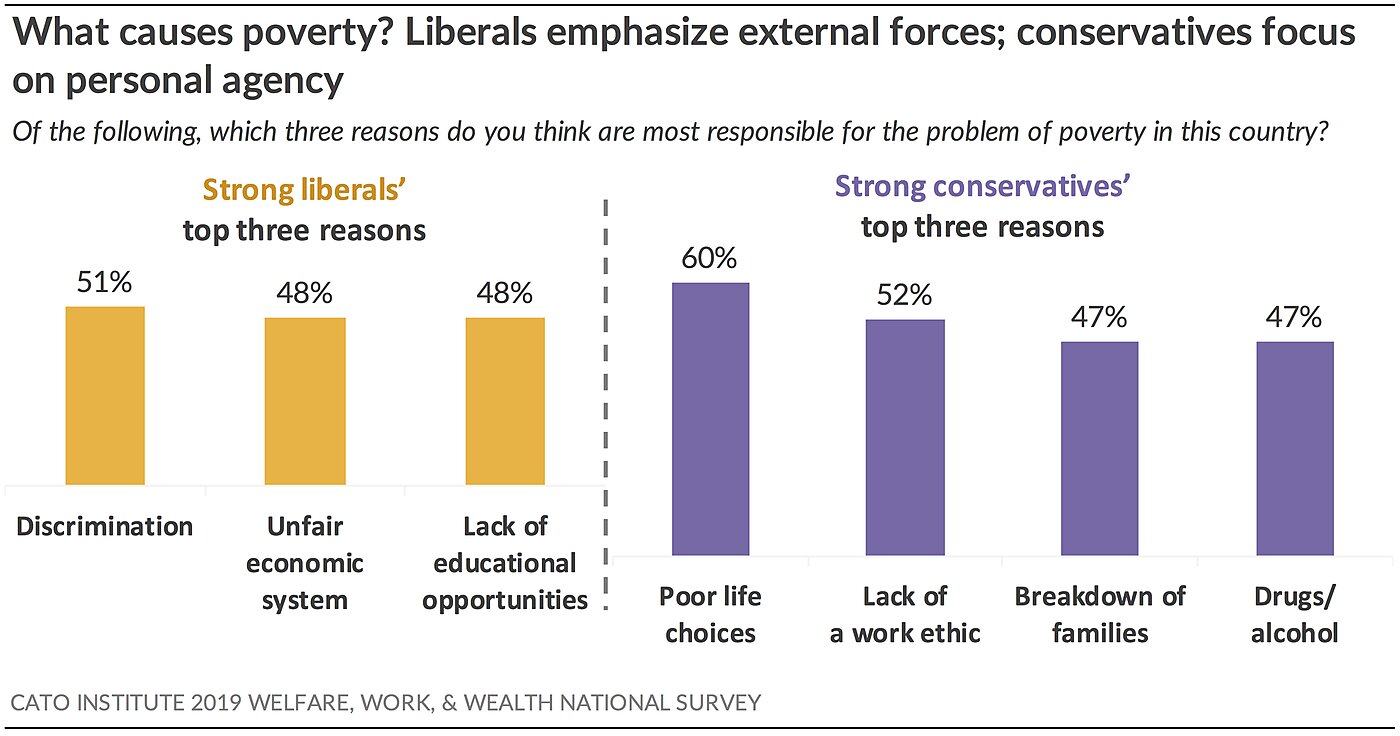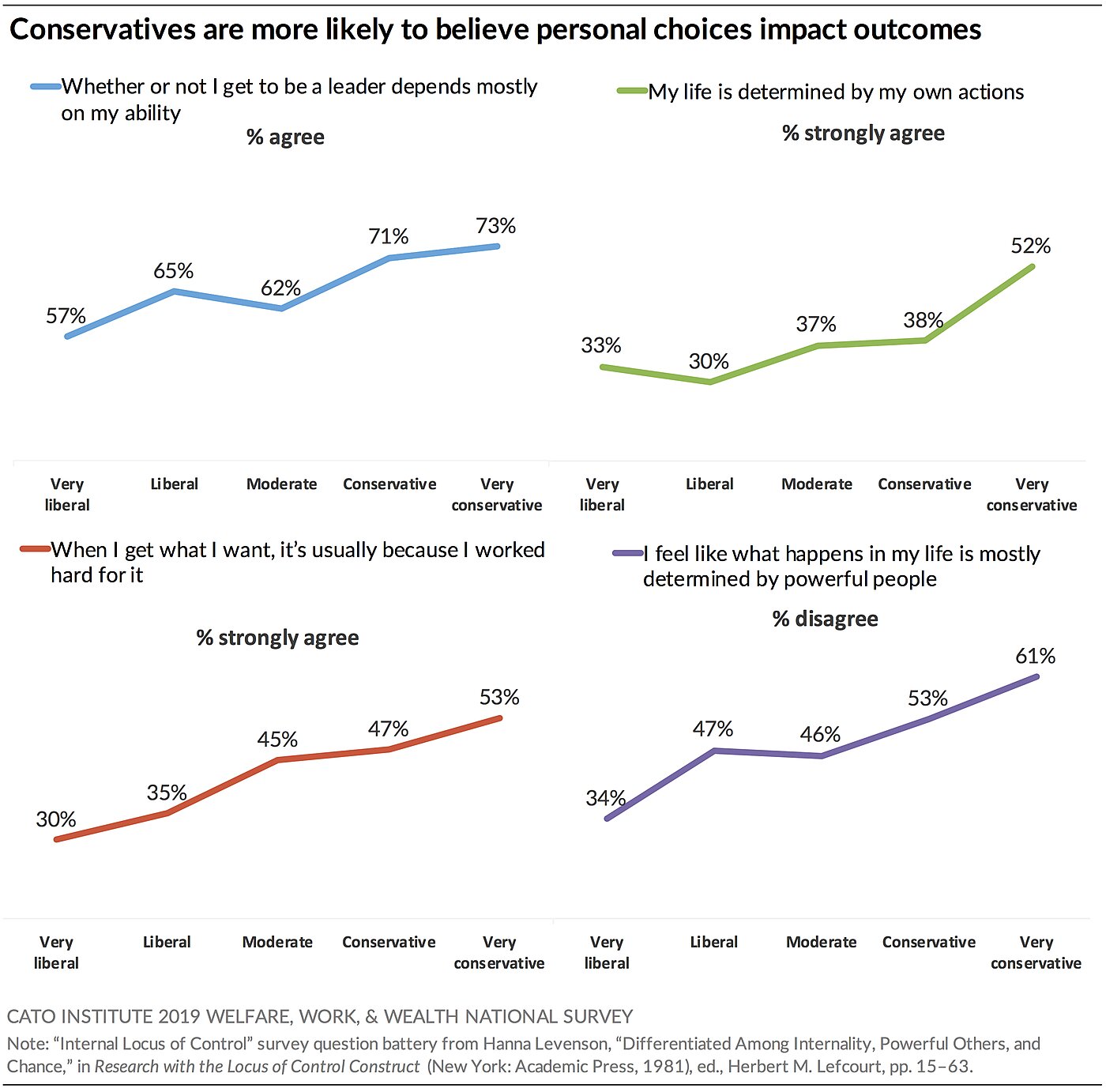The Cato 2019 Welfare, Work, and Wealth National Survey investigated what Americans believe cause wealth and poverty. Americans believe the top three reasons most important for determining a person’s wealth and success are hard work and grit (50%), ambition (38%), and family connections (31%). Not far behind include a willingness to take risks (29%), education (27%), inheritance (27%), self-discipline (27%), luck (20%), natural intelligence (18%), race and gender (11%), and special favors from government (9%).
Full survey results and report found here.
When asked the top three causes of poverty in this country, Americans agree that poor life choices (42%) and abuse of drugs and alcohol (40%) are key. But the public is divided about what the third factor is: about 3 in 10 think lack of job opportunities (29%), breakdown of families (29%), and a lack of work ethic (29%) are some of the most important reasons. After that, about a quarter say that a lack of educational opportunities (27%), discrimination like racism and sexism (25%), and an unfair economic system (22%) are the primary causes. Fewer say that government programs fostering dependency (14%), inadequate government programs (13%), lack of role models (8%), or a lack of delayed gratification (7%) are the most important causes of poverty in the United States.
Overall, most Americans tend to believe that wealthy people gain their wealth through the choices they make, such as working hard and being ambitious. Fewer people tend to emphasize external forces responsible for people’s wealth, such as immutable traits like race, intelligence, or luck. Americans are more likely to say external factors cause poverty but believe that personal choices matter too.
Ideological Divide
Liberals say wealth and poverty are largely due to chance. Conversely, conservatives believe wealth and poverty are largely due to personal choices.
- Strong liberals say the top reasons for people’s wealth: family connections (48%), inheritance (40%), and getting lucky (31%)
- Strong conservatives say top reasons for people’s wealth: hard work (62%), ambition (47%), self-discipline (45%)
- Strong liberals say the top causes of poverty are discrimination (51%), an unfair economic system (48%), and lack of educational opportunities (48%)
- Strong conservatives say the top causes of poverty are poor life choices (60%), a lack of work ethic (52%), breakdown of families (47%), and drugs and alcohol (47%)
Liberals and Conservatives Disagree about Personal Agency
Part of the reason liberals and conservatives disagree about the causes of poverty and wealth is that they disagree about the extent to which personal choices or external forces directs people’s lives. In other words: they disagree about the role of personal agency.
This idea is related to a concept in psychology called the locus of control. People who tend to believe events in their lives are within the control of the individual are described as having an internal locus of control. Those who tend to believe events in their lives are outside of a person’s control are described as having an external locus of control. While in reality both external forces and personal choices play a role, the question is what individuals emphasize.
Psychologists have developed survey questions intended to measure if one tends to have an internal or external locus of control. The Cato 2019 Welfare, Work, and Wealth Survey included a battery of these survey questions developed by psychologist Hanna Levenson to measure the extent to which Americans feel an internal or external locus of control.[1]
In general, a majority of Americans tend to feel that individuals have personal agency, or an internal locus of control. For instance, 74% of Americans agree that their lives are determined by their actions, and 78% believe that when they get what they want it’s usually because they worked hard to get it.
Ideological Differences in the Locus of Control
The survey finds that liberals emphasize external forces and that conservatives emphasize personal choices in explaining personal outcomes in their own lives. Strong conservatives are about 15–20 points more likely than strong liberals to agree that “whether or not I get to be a leader depends mostly on my ability” (73% vs. 57%), to strongly agree that “my life is determined by my own actions” (52% vs. 33%), and to strongly agree that “when I get what I want, it’s usually because I worked hard for it” (53% vs. 30%).
Discussion
These data demonstrate that liberals and conservatives emphasize the impact of personal agency on outcomes differently. Conservatives are more likely to believe that people are responsible for their situations and use their agency to direct their lives, and liberals are more likely to believe that people’s situations are shaped by their environment and other external factors. These differences in perception and emphasis likely lead liberals and conservatives to reach different conclusions about how public policy should approach poverty, welfare, work, and wealth.
Read more of the survey report here.
The Cato Institute 2019 Welfare, Work, and Wealth Survey was designed and conducted by the Cato Institute in collaboration with YouGov. YouGov collected responses online March 5 to 8, 2019 from a representative national sample of 1,700 Americans 18 years of age and older. The margin of error for the survey is +/- 2.2 percentage points at the 95% level of confidence.
[1]See “Internal Locus of Control” survey question battery from Hanna Levenson,“Differentiated Among Internality, Powerful Others, and Chance,” in Research with the Locus of Control Construct(New York: Academic Press, 1981), ed., Herbert M. Lefcourt, pp. 15–63.
